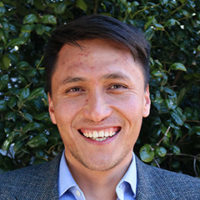Meet Jawad Zawulistani, a 2019-2020 Disaster Feedback Fellow who is listening to local voices to help communities in Afghanistan rebuild after withstanding decades of war.

A: Bamyan Foundation is working mostly on education, but also on health and other issues related to the community we are engaging with in Afghanistan. They belong to a minority and religious ethnic group that has been the most underprivileged community in the contemporary history of Afghanistan. We are working with local partners in different locations, including in Kabul, in Ghor, and in Bamyan. And we are planning to expand our field of operations in some other areas to help mostly the youth, and especially the girls, from this community realize their full potential and access quality education. We want to make sure that, as youth and children of one of the most underprivileged communities in Afghanistan, they have a say in the future of their country and can contribute to its development in the best possible way.
A: A lot of it comes from our personal experiences. Every member of our team at Bamyan Foundation has extraordinary stories of struggle for survival—for thriving. The problems and issues we have faced in our community and see our community is facing is the main driver. That makes our work, ourselves, and our effort, very value driven. This community is one of the most underprivileged communities in Afghanistan. We do not want these things to perpetuate, and one aspect that we are concerned about is not taking education seriously. If we do not make sure that the children of this community have the chance to realize their full potential, there is always the possibility that history repeats itself and takes all the chances they have for growth, for development, and for learning from them.
A: The stress and value we put on the local resources. That’s why our organization is registered in D.C., but we are not dictating activities, projects, or ideas from D.C. or areas other than the location where we work. We built partnerships, and then our partners are the experts in their field in those areas. They know whom to target, they know what local resources they can use in the best way, and they know how to realize our ideals and our mission in the best possible way. That is the power of the local people, the power of their ideas, and the power that they can create by working together.
A: GlobalGiving has given us the platform that we most needed, and that allowed us to share our stories with a broader, global audience. The second thing is the stories we hear from other people, and that provides a lot of learning opportunities for us. We get to see how other people in other parts of the world with their specific challenges are doing great work in their community, and we can learn from them.
A: I have worked with many organizations in Afghanistan, some of them international organizations, but the thing I have seen that is always missing is the real voices of people and the appreciation of the agency of the people you work with or try to serve. Because they think, ‘Oh, those illiterate communities, those poverty-ridden communities who have suffered long decades of war. They might not have anything to say; they might not have any ability to change their situation, so we go and change it.’
The thing I have seen that is always missing is the real voices of people.
There are ways to help them, but the reality that we have seen through the Bamyan Foundation’s work is that communities have developed and always continue developing ways for self-help. They know how to make the best use of the resources they have, and they know how to make the best use of the resources you provide for them. If you appreciate the agency of the local people and are flexible to their demands, to the way they work, and to their conditions, they will tell you how best to work with them. That’s the biggest lesson I have learned from them. It’s not us who should be going to communities and telling them what to do or how to do it. We should be flexible and let communities tell us how they want us to work with them.
Learn more about how GlobalGiving’s Disaster Feedback Fellows are sharing best practices to bolster community-led relief efforts.
Featured Photo by GlobalGivingFind exactly what you're looking for in our Learn Library by searching for specific words or phrases related to the content you need.